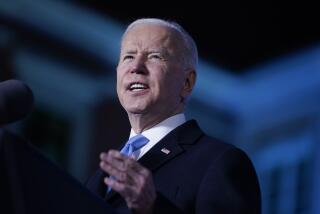Tax Panel Finds Small Revenue Loss in Reagan’s Proposal : Congressional Committee Sees Costs of Only $25.1 Billion Over 5 Years but Larger Shortfalls Beyond
- Share via
WASHINGTON — In a long-awaited report that should provide a boost to President Reagan’s faltering tax reform plan, the congressional Joint Tax Committee reported Thursday that the proposal would cost the government only $25.1 billion in tax revenue over the next five years, or less than 1% of federal revenue under current law.
But the estimates, which will be used as a basis for drafting tax overhaul legislation, suggest that Reagan’s tax package might produce significantly larger revenue shortfalls in future years. That is because the plan would lose an average of $10 billion a year in tax revenue starting in 1988.
Although the five-year revenue loss estimated by the committee is much smaller than many experts had predicted, it is greater than the five-year, $11.6-billion shortfall the Administration had projected. It is not likely to put to rest fears in Congress that tax reform would add to the federal budget deficit.
Changes Expected
The White House agreed to propose changes by Sept. 1 to assure that the package would be “revenue neutral”--that is, that it would not significantly alter the amount of tax money the government would collect.
Treasury Secretary James A. Baker III and the top-ranking Democratic and Republican members of the House and Senate tax-writing committees, concerned that the estimate could have an adverse “perceptual impact on the drive for tax reform,” issued a joint statement agreeing that “revenue neutrality is by no means out of reach.”
They added that the House Ways and Means Committee would not begin writing a tax reform bill “without a proposal from the Administration that is revenue neutral.” The statement left open the question of how much revenue loss would violate the concept of “revenue neutrality.”
In the past, Baker has suggested that any tax plan that loses or gains less than $50 billion over the next five years, or about 1% of total government revenues of $4.7 trillion, should be considered revenue neutral.
The Joint Tax Committee report implied that the plan should remain within 1% of government receipts from income, estate and excise taxes. That would permit a revenue gain or loss of just $28 billion out of revenues of $2.8 trillion.
Most other government revenue comes from Social Security taxes.
Findings Preliminary
Staff members of the Joint Tax Committee cautioned that their findings are preliminary and may be revised to reflect updated economic forecasts and refinements in estimating techniques. The figures rely on different economic assumptions from those used by the Treasury Department, but congressional analysts said that the “estimate of the proposal’s net impact on revenues is very similar to the estimate of the Treasury.”
The report found that individuals would save more in taxes than the Administration had originally projected, while taxes on corporations would remain about the same as estimated by the Administration.
According to the Joint Tax Committee analysis, individual income taxes would fall by $147.3 billion over the five years from 1986 to 1990. The Treasury had estimated the decline to be $131.8 billion.
For corporations, the congressional staff report estimated an increase of $122.2 billion over five years, about the same as Treasury’s prediction of a $120.2 billion boost.
In contrast to the Joint Tax Committee report, a study by the Congressional Budget Office last month suggested that the main corporate provisions of the tax plan would not raise as much revenue as the Administration projected.
Long-Run Drain Forecast
The CBO study, which looked at only changes in four major corporate tax provisions, also forecast a long-run drain on the federal budget of between $11 billion and $19 billion a year from 1993 to 2000.
When the CBO report was released, House Ways and Means Committee Chairman Dan Rostenkowski (D-Ill.), the key Democratic supporter of tax revision, said that the estimates “cast further doubts on the balance of the President’s plan.”
Rostenkowski already has suggested that Congress is likely to make several changes, including phasing in some provisions more slowly than the Administration proposed, which would add to future budget deficits. As a result, he has been insisting that the Administration’s plan be as close to revenue-neutral as possible and that any revenue-losing changes must be balanced by other provisions that provide an equivalent gain.
The Joint Tax Committee report, like Treasury’s original estimates, does not examine the impact of the plan beyond 1990, and congressional staff members pointed out that such long-range estimates can be highly unreliable.
More to Read
Get the L.A. Times Politics newsletter
Deeply reported insights into legislation, politics and policy from Sacramento, Washington and beyond. In your inbox twice per week.
You may occasionally receive promotional content from the Los Angeles Times.








